Diplococcic - Study guides, Class notes & Summaries
Looking for the best study guides, study notes and summaries about Diplococcic? On this page you'll find 66 study documents about Diplococcic.
Page 4 out of 66 results
Sort by
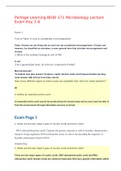
-
Portage Learning BIOD 171 Microbiology Lecture Exam Key 1-6
- Exam (elaborations) • 34 pages • 2022
-
- $13.99
- + learn more
Portage Learning BIOD 171 Microbiology Lecture Exam Key 1-6 Exam 1. True or False: A virus is considered a microorganism. False. Viruses are not living and as such are not considered microorganisms. Viruses can, however, be classified as microbes, a more general term that includes microorganisms and viruses. 2. What is the smallest biological unit of life? A cell. 3. At a generalized level, all cells are comprised of what? Macromolecules* *A student may also answer: Proteins,...
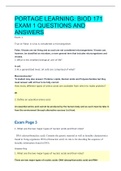
-
PORTAGE LEARNING: BIOD 171 EXAM 1 QUESTIONS AND ANSWERS
- Exam (elaborations) • 34 pages • 2022
-
Available in package deal
-
- $14.49
- + learn more
PORTAGE LEARNING: BIOD 171 EXAM 1 QUESTIONS AND ANSWERS Exam 1. True or False: A virus is considered a microorganism. False. Viruses are not living and as such are not considered microorganisms. Viruses can, however, be classified as microbes, a more general term that includes microorganisms and viruses. 2. What is the smallest biological unit of life? A cell. 3. At a generalized level, all cells are comprised of what? Macromolecules* *A student may also answer: Proteins, Lipids,...
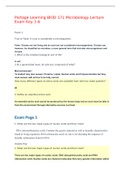
-
Portage Learning BIOD 171 Microbiology Lecture Exam Key 1-6
- Exam (elaborations) • 34 pages • 2022
-
- $15.09
- + learn more
Portage Learning BIOD 171 Microbiology Lecture Exam Key 1-6 Exam 1. True or False: A virus is considered a microorganism. False. Viruses are not living and as such are not considered microorganisms. Viruses can, however, be classified as microbes, a more general term that includes microorganisms and viruses. 2. What is the smallest biological unit of life? A cell. 3. At a generalized level, all cells are comprised of what? Macromolecules* *A student may also answer: Proteins,...
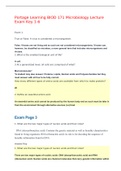
-
Portage Learning BIOD 171 Microbiology Lecture Exam Key 1-6
- Exam (elaborations) • 34 pages • 2022
-
- $15.19
- + learn more
Portage Learning BIOD 171 Microbiology Lecture Exam Key 1-6 Exam 1. True or False: A virus is considered a microorganism. False. Viruses are not living and as such are not considered microorganisms. Viruses can, however, be classified as microbes, a more general term that includes microorganisms and viruses. 2. What is the smallest biological unit of life? A cell. 3. At a generalized level, all cells are comprised of what? Macromolecules* *A student may also answer: Proteins,...
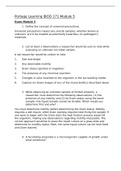
-
Portage Learning BIOD 171 Module 5 Exam Module 5
- Exam (elaborations) • 7 pages • 2022
-
- $15.49
- + learn more
Portage Learning BIOD 171 Module 5 Exam Module 5 1. Define the concept of universal precautions. Universal precautions means any and all samples, whether known or unknown, are to be treated as potentially hazardous (or pathogenic) materials. 2. List at least 3 observations a researcher would be sure to note while assessing an unknown microbial sample. A lab researcher would be certain to note: 1. Size and shape 2. Any observable motility 3. Gram status (positive or negative) 4. The pr...
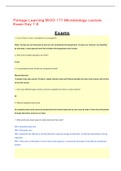
-
Portage Learning BIOD 171 Microbiology Lecture
- Exam (elaborations) • 28 pages • 2022
-
- $17.49
- + learn more
Portage Learning BIOD 171 Microbiology Lecture Exam Key 1-6 Exams 1. What are the two major types of nucleic acids and their roles? DNA- deoxyribonucleic acid RNA- Ribonucleic acid DNA- Cellular life has DNA and a role that DNA has is long-term storage of information, it holds the characteristics of living organisms. RNA- Is the carrier of information in form of amino acid sequence. It converts the information in the DNA and synthesizes proteins 1. True or False: A virus is considered...
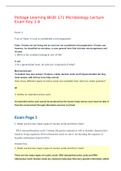
-
Portage Learning BIOD 171 Microbiology Lecture Exam Key 1-6
- Exam (elaborations) • 34 pages • 2022
-
- $15.99
- + learn more
Portage Learning BIOD 171 Microbiology Lecture Exam Key 1-6 Exam 1. True or False: A virus is considered a microorganism. False. Viruses are not living and as such are not considered microorganisms. Viruses can, however, be classified as microbes, a more general term that includes microorganisms and viruses. 2. What is the smallest biological unit of life? A cell. 3. At a generalized level, all cells are comprised of what? Macromolecules* *A student may also answer: Proteins,...

-
BIOD 171 Portage Learning Final EXAM Questions and Answers 100%Correct/Exam 1-7 2023/2024 Update True/False. A virus is considered a microorganism. - correct answer-False, Viruses are not living and as such are not considered microorganisms. Viruses can
- Exam (elaborations) • 30 pages • 2024
-
- $6.99
- + learn more
BIOD 171 Portage Learning Final EXAM Questions and Answers 100%Correct/Exam 1-7 2023/2024 Update True/False. A virus is considered a microorganism. - correct answer-False, Viruses are not living and as such are not considered microorganisms. Viruses can, however, be classified as microbes, a more general term that includes microorganisms and viruses. What is the smallest biological unit of life? - correct answer-A cell What are the four main types of macromolecules found in cells? -...
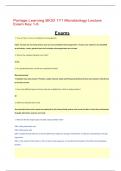
-
Portage Learning BIOD 171 Microbiology Lecture Exam Key 1-6
- Exam (elaborations) • 28 pages • 2023
-
- $15.99
- + learn more
Portage Learning BIOD 171 Microbiology Lecture Exam Key 1-6 Exams 1. What are the two major types of nucleic acids and their roles? DNA- deoxyribonucleic acid RNA- Ribonucleic acid DNA- Cellular life has DNA and a role that DNA has is long-term storage of information, it holds the characteristics of living organisms. RNA- Is the carrier of information in form of amino acid sequence. It converts the information in the DNA and synthesizes proteins 1. True or False: A virus is considered...
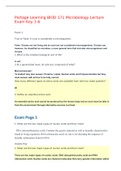
-
Portage Learning BIOD 171 Microbiology Lecture Exam Key 1-6
- Exam (elaborations) • 34 pages • 2022
-
- $14.99
- + learn more
Portage Learning BIOD 171 Microbiology Lecture Exam Key 1-6 Exam 1. True or False: A virus is considered a microorganism. False. Viruses are not living and as such are not considered microorganisms. Viruses can, however, be classified as microbes, a more general term that includes microorganisms and viruses. 2. What is the smallest biological unit of life? A cell. 3. At a generalized level, all cells are comprised of what? Macromolecules* *A student may also answer: Proteins,...

Did you know that on average a seller on Stuvia earns $82 per month selling study resources? Hmm, hint, hint. Discover all about earning on Stuvia


